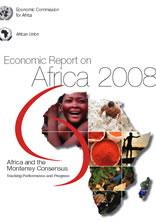Economic Report on Africa 2008

In 2007, Africa sustained the high growth momentum of the past few years, registering an average growth rate of 5.8 per cent. As in previous years, Africa’s growth performance in 2007 was driven mainly by robust global demand and high commodity prices. Other factors underpinning growth in Africa include continued consolidation of macroeconomic stability and improving macroeconomic management, greater commitment to economic reforms, rising oil production in a number of countries, increased private capital flows, debt relief and increasing non-fuel exports. Africa has also witnessed a decline in political conflicts and wars, especially in West and Central Africa, though peace remains fragile in some parts of the continent. However, growth in Africa has not yet led to substantial employment generation. At the same time, vulnerable groups such as the aged, youth and people with disabilities have not benefited from Africa’s growth recovery. African women and girls in particular continue to experience various forms of discrimination and social exclusion.
Midway between the adoption of the MDGs and the 2015 target date, the available evidence indicates that the vast majority of African countries will not meet the goals if current financing trends continue. Consequently, the international community has now focused attention on how to scale-up financing for the continent. Implementation of the commitments in the Monterrey Consensus is critical to achieving this objective. Consequently the 2008 edition of the Economic Report on Africa assesses progress in terms of meeting commitments to Africa in the six core areas of the Monterrey Consensus: mobilizing domestic financial resources for development; mobilizing international resources for development; promoting international trade as an engine of development; increasing international financial and technical cooperation for development; external debt relief and sustainability; and addressing systemic issues.